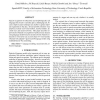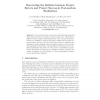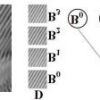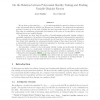923 search results - page 8 / 185 » Factorizing Languages |
117
Voted
ICASSP
2009
IEEE
15 years 6 months ago
2009
IEEE
Speech recognition of inflectional and morphologically rich languages like Czech is currently quite a challenging task, because simple n-gram techniques are unable to capture impo...
121
click to vote
EUROSPI
2004
Springer
15 years 7 months ago
2004
Springer
Post-mortem project reviews often yield useful lessons learned. These project reviews are mostly recorded in plain text. This makes it difficult to derive useful overall findings ...
106
click to vote
ADBIS
2009
Springer
15 years 9 months ago
2009
Springer
We propose linear systems of hedge language equations (LSH) as a formalism to represent regular hedge languages. These linear systems are suitable for several computations in the a...
129
click to vote
ICIP
2008
IEEE
16 years 4 months ago
2008
IEEE
In this paper, we present a patch-based variational Bayesian framework of image processing using the language of factor graphs (FGs). The variable and factor nodes of FGs represen...
136
click to vote
ICALP
2010
Springer
15 years 7 months ago
2010
Springer
We say that a polynomial f(x1, . . . , xn) is indecomposable if it cannot be written as a product of two polynomials that are defined over disjoint sets of variables. The polynom...




